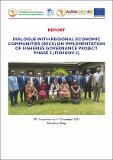Dialogue with Regional Economic Communities (RECS) on Implementation of Fisheries Governance Project Phase 2 (FishGov 2)

(en=English; ar=Arabic; fr=French; pt=Portuguese)
Language
enDate
2021-12-29Author
AU-IBAR, AUDA-NEPAD, EU
Type
ReportItem Usage Stats
143
views
views
60
downloads
downloads
Abstract
Activities of the AU-IBAR in Fisheries and Aquaculture Development is guided by the Policy
Framework and Reform Strategy for fisheries and aquaculture in Africa (PFRS) and the Africa Blue
Economy Strategy (ABES). The two blueprint policy documents are targeted towards facilitating
the transformation of Africa’s fisheries and aquaculture for food, livelihoods and wealth within the
framework of the Malabo Declaration and AU Agenda 2063 for accelerated African development.
In domesticating these key policy instruments, AU-IBAR, in collaboration with African Union
Development Agency (AUDA-NEPAD), are implementing a Fisheries Governance project phase 2
(FishGov 2). The overall objective is to improve food security, livelihoods and wealth creation in
sustainable fisheries and aquaculture, aligned with AU Agenda 2063. The specific objectives are (i)
African Union decisions on sustainable fisheries and aquaculture policies are evidence-based (ii)
Fisheries and aquaculture policies in Africa are coherent with the PFRS and other AU priorities and
coordinated at continental, regional and national levels (iii) Africa is adequately represented and
effectively participates in international fisheries and aquaculture fora and ably domesticates and
effectively implements relevant global instruments
Description
One of the main activities in the FishGov 2 project is to support dialogue and sensitisation at
the Regional Economic Communities (RECs) level, particularly on emerging issues of the Action.
This Action is in line with the objectives of the African Fisheries Reform Mechanism (AFRM),
a continental partnership platform aimed at facilitating coordination and coherence in the
governance of the fisheries and aquaculture sector. Specifically, the AFRM supports information
sharing on lessons and best practices, enhances communication, fosters institutional collaboration,
promotes partnerships, strengthens evidence-based policy formulation, and promotes integration
or mainstreaming of the sector into AU policy processes, increasing common African positions in
regional and global fora.